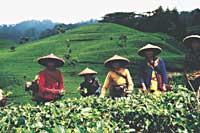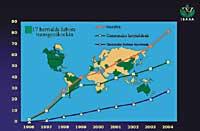Unstoppable expansion of GM crops
class="art-text" valign="top">

The agency responsible for the applications of biotechnology in agriculture, ISAAA, tracks GM crops. Data from last year have recently been collected and are very satisfied to have planted 20% of the planted area in 2004 in 2003. Already 81 million hectares have been planted with GMOs.
The number of farmers who have planted these hectares has also been estimated at 8.25 million, 1.25 million more than in 2003. They have also known that 90% of these farmers come from developing countries. In fact, the area dedicated to GMOs has increased more than in developing countries, which is the first time it occurs. Specifically, in developing countries 7.2 million hectares have been planted with GMOs and 6.1 million hectares in developed countries.
According to the president of ISAAA, this shows that GMOs are really beneficial for poor farmers. They have realized that the benefits are not only economic, but also good for society, the environment and health. By the way, the Lehendakari has recognized that they have had much to do with government aid.

On the other hand, the number of countries with more than 50,000 hectares cultivated with transgenic plants has increased from 10 to 14 in 2004, while Paraguay, Mexico, the Philippines and Spain have joined the group of mega-producer countries. This group is led by the US, with 58% of GMOs produced in the world, Argentina with 20%, Canada and Brazil with 6%, China with 5%, Paraguay with 2%, India and South African Republic with 1%, and finally, Mexico, Spain, the Philippines, Uruguay, Australia and Romania.
In view of the list, it highlights the existence of a single country of the European Union, Spain. Compared to 2003, Spain has increased its area dedicated to GM crops by 80%. Currently, Bt maize fields occupy 58,000 hectares. According to the ISAAA, it seems that the position of European countries is changing and hopes that, as has happened in Spain, more and more GMOs are being planted in other countries.
Those of ISAAA, therefore, are hopeful. They are now awaiting authorization to plant Bt rice in China. The impact is expected to be enormous. It seems that, despite the opposition of many environmental groups, the use of transgenic plants is spreading all over the world and at the moment it does not seem to recede.
Buletina
Bidali zure helbide elektronikoa eta jaso asteroko buletina zure sarrera-ontzian












